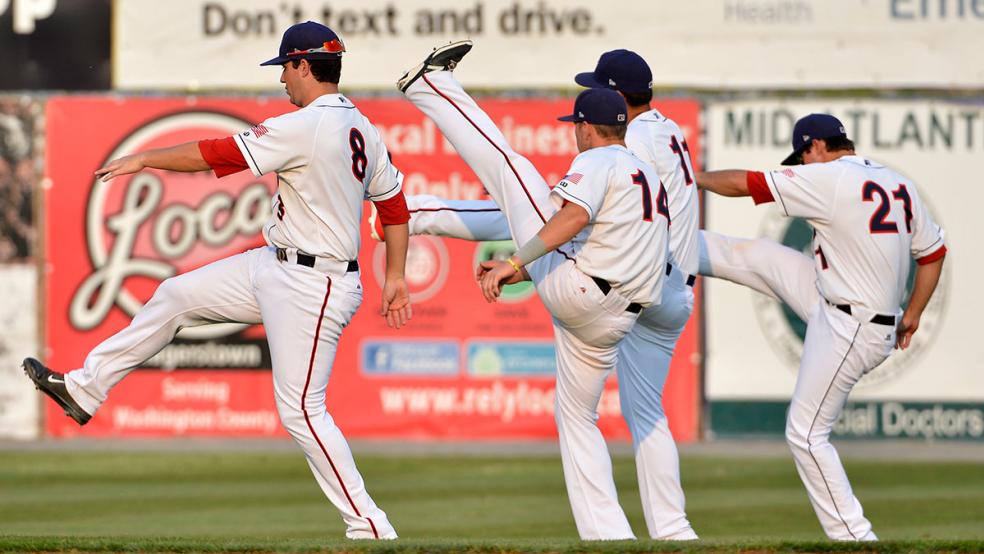For generations, minor league professional baseball has been a place where young men chasing a dream go to endure endless bus rides, punishing practice and conditioning requirements, and absurdly low pay, all in service of a web of organizations that enjoy unique protections from federal antitrust laws and which have the power to arbitrarily require them to move across the country on a moment’s notice.
Last week, two members of the United States Congress introduced legislation to make sure it stays that way. Rep. Brett Guthrie (R-KY) and Rep. Cheri Bustos (D-IL) introduced the Save America’s Pastime Act (no, really -- the “SAP” Act) to clarify that federal law allows Major League Baseball organizations to pay their employees something approaching a starvation wage.
Related: Drop the Tuba, Pick Up a Gun. Military Bands Under Fire from Congress
The proposal is a boon to Minor League Baseball, which has become increasingly worried about a lawsuit that a former pitcher turned attorney filed on behalf of current and former players. Garrett Broshuis, a who pitched in the San Francisco Giants organization, last year convinced a federal court to allow a suit involving a few dozen former players to expand to include about 10,000 former players.
Their argument is that the compensation for most minor league ballplayers -- between $1,100 and $2,150 per month in a five-month, 140-game season -- is in violation of the Fair Labors Standards Act. They argue that when all the travel, conditioning and game time are considered, the average hourly wage for a minor league player is much lower than the federal minimum wage. The lawsuit asks for compensation for wages that should have been paid, and for a more equitable arrangement in the future.
This, according to Guthrie and Bustos, is unconscionable.
“Minor League Baseball is a beloved game in communities across America,” Guthrie said in a statement, naming several Kentucky towns that have local teams. “The game provides an affordable, family-friendly environment while bringing revenue to host cities and contributing to broader economic development. Furthermore, the Minor Leagues offer the best opportunity for players to pursue their dream of one day playing in the Big Leagues, as several local players have done over the years. I look forward to working with Congresswoman Bustos to advance the bill and ensure that this great game and the communities that support it are protected from potentially devastating cuts.”
Related: Trump and Clinton Square Off on Saving Social Security
Bustos, whose father was a lobbyist for Major League Baseball in Washington, said, “Minor League teams are critically important, not just to the players and their parent teams, but to the communities they serve like Peoria and the Quad-Cities. This common sense proposal will close a loophole to ensure the long-term viability of Minor League teams in communities across our nation and I look forward to working with Congressman Guthrie to get it done.”
The league was, unsurprisingly, grateful, and echoed their suggestion that paying young players something approaching a living wage would have an apocalyptic effect on the sport.
“Minor League Baseball would like to thank Congressman Guthrie and Congresswoman Bustos for their leadership on this issue facing Minor League Baseball and for gathering bipartisan Congressional support,” Minor League Baseball President & CEO Pat O’Conner said in a statement. “For over 115 years, Minor League Baseball has been a staple of American communities, large and small, and with the help of Congressman Guthrie, Congresswoman Bustos and other members of Congress, it will remain so for years to come.”
However, the idea that requiring minor league players to be compensated at something above starvation-level wages would destroy minor league baseball programs is dubious at best, considering that player salaries are paid not by the owners of small farm teams but by the multi-billion dollar professional organizations that draft them.
Related: The Most Dangerous Toys of Summer
Broshuis, understandably, was unimpressed.
“It’s despicable,” he told the Sporting News. “You have billionaire major-league owners working with millionaire minor-league owners to add to their pockets more, and at the same time you have minor-leaguers who are making below the poverty wage. You’re talking about a group of guys whose salaries start at $1,100 per month, and they’re only paid during the season. They’re not paid during spring training. They’re not paid during instructional leagues.”
He continued, “You’re working seven days a week more often than six days. For a 7 o’clock game, you’re often getting to the ballpark around 1 o’clock, many, many hours before the game because you have all the pregame work you have to do,” Broshuis told the paper. “And you often aren’t leaving until 11. Those are 10 hour days. Even on day games, you’re putting in six hours or so.”
The SAP Act (not the official acronym, but really, who can resist?) so far only has Guthrie and Bustos as sponsors, and its future is unclear. But even if they add amendments asserting the enduring importance of mom and apple pie to American culture, they might have trouble attracting more support.





